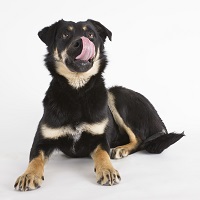
Kurt Mychajlonka, DVM
Veterinarian Kurt Mychajlonka D.V.M. [Dr.Mych] of Craig Road Animal Hospital in North West Las Vegas identifies the causes why a dog might eat his own feces, aka coprophagia, and shares some helpful tips on how to nix the dirty habit.
By Kurt Mychajlonka, DVM
Yes, dogs eat poop, no matter how horrified the owner may be. But eating poop-technically known as coprophagia-is actually a common canine behavior.
When puppies are first born, mother dogs clean their puppies and ingest their feces and urine in the process. And yes, cat mothers do the same thing. Newborn pups are pretty helpless in the beginning-they can’t see, they can’t walk. The nest would get unsanitary very quickly if the mother were to allow the waste to accumulate. It is only when the puppies start eating solid food and are able to leave the nest to relieve themselves, that mom doesn’t have to worry about those little snacks left around.

“Thanks for the clean-up, mom!”
Although this behavior is recognized as natural canine behavior, it shouldn’t be ignored and may require medical attention or behavior modification.
In the instance of indoor accidents, dogs may develop a connection between punishment and presence of fecal material. Dogs may ingest their own feces so they won’t get into trouble. This is why it is important to not use negative reinforcement when housebreaking.
Boredom can be another reason for dogs to eat feces. A busy dog doesn’t have time to be bored, so increase your dog’s daily exercise through walks, playing ball, or practicing obedience commands or tricks. Give your dog a Kong filled with frozen peanut butter, or their favorite treat, to keep your dog entertained and distracted.
Another strategy to combat coprophagia is to change to a different variety of dog food. Your veterinarian may recommend a prescription or hypoallergenic diet to address underlying digestive problems. Ask your veterinarian about your individual dog’s health and diet recommendations. Always mix the new food in with the old to gradually change it over a period of 7 to 10 days.

Coprophagia can be caused by a multitude of medical and behavioral symptoms.
Another tool to break the stool eating habits are food additives like CoproBan, a roast beef flavored soft chew which is fed along with a meal and has the effect of making the stool taste undesirable. Yes, as if stool didn’t already sound undesirable tasting enough!
If none of the above works, there may be a medical problem going on with your pet. Intestinal parasites can cause dogs to eat waste due to changes in their stool. Provide a fresh fecal sample to your veterinarian to screen for any parasites. Underfeeding, a poor quality diet, or going too long between meals, may contribute to coprophagia. Your veterinarian can help evaluate your dog’s weight, provide a dietary recommendation, and provide an individualized feeding schedule that best suits your dog’s needs.
Constant outdoor supervision combined with positive reinforcement training is another method to help kick your dog of this particular habit. You’ll need a collar or head halter for the dog, a leash, and some small treats that they favor. If your dog is easy to handle, just a collar will suffice. A head halter is used for dogs more motivated to ingest feces as it will give you more control of the dog’s mouth than a collar alone. Always use the leash when taking your dog out to use the potty. The moment your pet’s waste hits the ground, call the dog over to you while keeping the treats out of sight. As soon as your dog reaches you, praise them and give them the treat. Then back away, call them again, and give them another treat. Repeat this process three to four times and the dog will have completely forgotten about his poop.
Make sure to clean stool up immediately, but only when your dog isn’t around. The best way to combat the desire to eat poop is to not have it near them. Not only is it unhealthy for your dog to eat waste, it isn’t sanitary to have feces lying around for you either. It is important to start intervention as soon as you notice your dog eating his own waste. The less time the habit gets to develop the easier it will fade. As with many behavior problems, supervision is key. Do not leave your dog unsupervised in the backyard- you cannot prevent what you aren’t witnessing!
If you encounter your dog in the act of snacking on feces, resist the temptation to yell and chase him about. Yelling and chasing may serve as reinforcement of this “game” in the future. The better strategy is to distract your dog with a squeaky toy or running in the opposite direction- either game is more fun and will distract your dog from the fecal treat nearby.
So don’t feel too bad when you notice your dog treating themselves to their own or someone else’s poop as a snack. You’re not alone, and neither are they.


8 comments